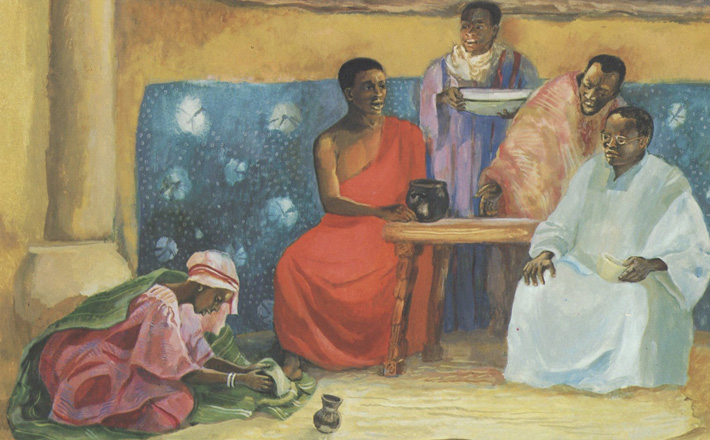Commentary on 1 Kings 21:1-10 [11-14] 15-21a
“I don’t preach a social gospel; I preach the Gospel, period. The gospel of our Lord Jesus Christ is concerned for the whole person. When people were hungry, Jesus didn’t say, ‘Now is that political or social?’ He said, ‘I feed you.’ Because the good news to a hungry person is bread.” – Bishop Desmond Tutu.
When interpreting biblical narrative, it is important to understand that classical Hebrew does not employ tenses like we have in English (present, past, future, etc.). Instead, biblical Hebrew employs something referred to as “aspect” — more specifically, the “aspect” of a verbal action in relation with the historical anchor, which typically appears at the beginning of the passage (An example of historical anchor is the opening to the book of Ruth, “In the days when the judges ruled…”).
For this week’s reading, the historical anchor in 1 Kings 21:1 introduces certain terms that have associations that will help us understand the rest of the passage, “Later the following events took place: Naboth the Jezreelite had a vineyard in Jezreel, beside the palace of King Ahab of Samaria.” Jezreel introduces a place of great blessing, and a royal palace for Ahab. It literally means, “God planted;” the Jezreel valley is tremendously fertile (Google Image it) and you can quickly understand how it got its name.
Ahab stands for a king who deeply fell to the temptations of Canaanite idolatry. Samaria is the new palace from the Omri house, later a place where Amos condemned for its social injustices. All of these concepts of idolatry permeate the opening verse, the historical anchor of the text, and the natural reading of the passage must keep in mind these associations.
The narrative moves quickly. Despite being King of Israel and having access to all the commensurate royal perks and privileges, Ahab sees and covets a neighboring plot of land. He commands the owner, Naboth, to hand over the land, even offering a fair price, but in reality, the land is not for sale. In a narrative surprise, the citizen sternly rebukes the king, refusing the offer on the grounds of YHWH and the presumed patriarchal right of the landowner.
With the refusal, the king responds in “angry and sullen” but this reaction is merely a mask for depression as, “He lay upon his bed, turned his face, and did not eat food” (verse 4). Interestingly, many commentators suggest that depression ensues because Ahab wanted the vineyard so badly, but in reality the Bible is ambiguous on this issue. In reading the text, it appears just as likely that Ahab was depressed over the defiant reaction of the commoner.
It turns out that the non-royal neighbor was not the only one to push around Ahab. The king’s passivity contrasts with the bold initiative of Queen Jezebel, who “came to him” and “said to him” (verse 5). She both admonishes the king (“Do you now govern Israel?” verse 7), but does it with a comforting assurance (“be cheerful”). She devises a plan to obtain the land and, because the only legal recourse is through the death of the owner, she creates a complex plot to kill Naboth. She acts with the authority of a true king. Her usage of the royal seal is deliberately symbolic. Upon the death of Naboth, Jezebel expectedly tells Ahab to claim the land. But afterwards, the Lord sends Elijah to condemn the action.
Our modern twenty-first century sensibilities prevent us from easily grasping the concept of buying land, just as it would be hard to explain the profession of a modern real estate agent to the ancient Israeli. Land was rarely bought and sold, and when it was done, it was only done to people within the kin. Even the royal land of Samaria was sold to a kinsman (see 1 Kings 16:24). Land was a gift from God, a symbol of provision and conquest. In a time with limited mechanisms to store wealth, land was the income, resource, home, bank account and retirement plan of the people.
Through the land, people grew their food, paid their obligations to the royal house, sheltered their children, and assured some degree of livelihood for their progeny. Land is not to be taken by royal interest, congruent with land and inheritance texts from the ancient Near Eastern world. Thus, Ahab could not just take the vineyard with any legitimacy, but Jezebel had to devise a complex plan for him.
But what happens when the wealthy royal king covets and seizes the only possession of a commoner? It is within such a context that the Lord calls for a prophetic response, specifically a direct condemnation and portending of a grotesque death (verse 18-19). There is no denial by the king for he knows that he was guilty — “Have you found me, O my enemy?” (verse 20a).
Interestingly, the prophetic pronouncement does not name the sin against Naboth, but Elijah says “You have sold yourself to evil in the eyes of YHWH.” In other words, the stealing of the land and concomitant murder was a religious violation. By unjustly taking Naboth’s rightful possession, Ahab (and Jezebel) disobey the command of God.
This fits with the initial pronouncement and the historical anchor back in 21:1. The words Jezreel, Ahab, Samaria are all associated with religious idolatry. Social injustice is not merely a horizontal violation of our fellow human. It is primarily a vertical violation of God by wronging his creation, made in his image. In other words, we tend to interpret this narrative of Naboth’s vineyard as social gospel, but really, the passage shows us that we cannot separate the social and the spiritual. Our relationship with God is reflected in the way we treat our fellow human who is made in God’s image.


June 16, 2013